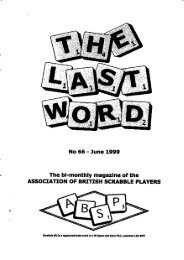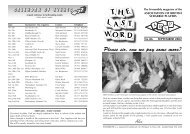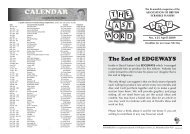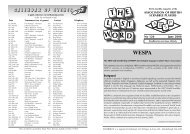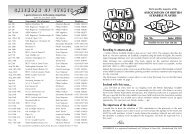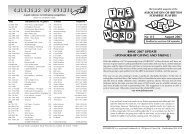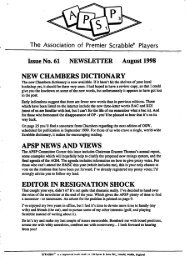TLW 111 - Nomads Results
TLW 111 - Nomads Results
TLW 111 - Nomads Results
Create successful ePaper yourself
Turn your PDF publications into a flip-book with our unique Google optimized e-Paper software.
Personal Profile 1 ~ Ed Martin<br />
This is a new series in which leading players are encouraged to reveal exactly what they have<br />
done in the past to get as good as they are, and what they are doing now to get even better.<br />
My first guest is Ed Martin. With a current ABSP rating of 194 and a best ever of 198, Ed has<br />
been consistently among our top ten players for some time now, and achieved an excellent<br />
second place in the recent 2006 Masters.<br />
Ed, can you start by saying a little about your progress through<br />
the Scrabble ranks.<br />
I have been playing competitive Scrabble for 16 years, though<br />
I hardly played between 1994 and 2000. I had reached 187 in<br />
1993, but when I restarted it seemed to me that standards had<br />
improved enormously, at least among 160 to 190 players, and<br />
it was a long slow climb to get back. I reached the 170s in<br />
2003, the 180s in 2004 and the 190s in 2005.<br />
Approximately how many hours per day, on average, do you<br />
devote to the play and/or study of the game?<br />
Approximately one hour studying daily on the way to and from<br />
work. In addition I reckon to play about ten rated (tournament)<br />
games per month, plus three friendlies in the Middlesex league. Ed Martin<br />
Can you describe what forms your study takes, in order of importance to you.<br />
First and foremost, self-testing on anagrams. This incorporates work on hooks, since I study<br />
hooks as I anagram - e.g. if I am testing myself on CDEEILRS, I have to come up with not only<br />
the word but its hooks. If I learn a word, I take that to include its hooks. I don’t time the<br />
anagrams, but tend to give up if I haven’t got the answer in twenty seconds or so.<br />
Next in importance to me comes general word familiarisation, from OSWI or the dictionary.<br />
This is followed by analysis of my own games using a simulation tool. I do also play against<br />
the computer, but not very often. When I do play the computer, I treat it as a tournament<br />
game i.e. no looking up words or kibitzing!<br />
Can you say roughly what proportion of your study time you spend on each of the word<br />
lengths from 4 to 8?<br />
4 - 8%; 5 - 30 %; 6 - 2%; 7 - 30%; 8 - 30%.<br />
In the case of seven- and eight-letter words, can you roughly quantify the way in which you<br />
weight your study, if you do, towards higher probability words.<br />
By probability, I reckon to concentrate on 1-8000 for 7s and 8s. But recently I have been<br />
trying to weight my study to the letters I will probably be retaining on my rack. For example,<br />
CONIDIA has the same probability as INCEDES, but the latter is more likely to come up<br />
because I am likely to retain Es and Ss. So I have been learning words containing certain sets<br />
of 4 letters e.g. AERS, EIST, EIRS, that I consider likely to appear on my rack - although I stop<br />
when the list appears to be getting to low probability words.<br />
Do you spend any time on the study of words of nine letters or more?<br />
Only insofar as I learn the hooks when I learn 8s.<br />
Do you study bonus stems?<br />
No, just the straight anagrams.<br />
36<br />
Do you use any mnemonic techniques, e.g. anamonics, associative phoneys, or the kind of<br />
more elaborate techniques described in ‘How To Win at Scrabble’?<br />
I use lots of mnemonics for 3-4 and 4-5 hooks, including cases where the 3 isn’t a word, in<br />
order to learn fours. For example, to learn the front hooks for ?YTE (which are B, C, G, H,<br />
K, L, T and W) I have an anamonic - ‘thick black wig’ - think Jimmy ‘Yte’!<br />
When you analyse your own games, do you find that when you miss the optimum move, this<br />
is most often a) because you simply don’t know the word, b) because you know the word<br />
but don’t find it or c) because you know the word and find it but fail to recognise that it is<br />
the optimum move.<br />
Very much a). It’s hard to quantify, but there are undoubtedly a lot of words in SOWPODS,<br />
even of eight letters or less, that I just don’t know.<br />
Do you attempt to ‘peak’ for certain events (i.e. intensify your study) or do you tend to keep<br />
at a consistent level throughout?<br />
I aim at a consistent level throughout.<br />
To what extent do you find that once you have learnt words you tend to remember them<br />
and to what extent do you find that your word knowledge suffers from ‘fade’ and requires<br />
constant reinforcement?<br />
I find that the knowledge fades and needs reinforcement, though this is hard to quantify.<br />
How interested are you in the meanings of the words?<br />
I am interested when I come across them, but I don’t make a special effort to seek them out.<br />
Would you describe your attitude towards significant extensions to the Scrabble lexicon<br />
(such as happened with OSWI and may happen with Collins) as apprehension, excitement<br />
or something between?<br />
Neither apprehensive nor unduly excited. I am very keen, though, that there should be a high<br />
level of lexicographical integrity to the word source.<br />
Do you feel that as far as individual tournaments go, being ‘in form’ plays a significant role<br />
in Scrabble success?<br />
No - I don’t believe much in the concept of form. One should simply aim always to be in a<br />
good frame of mind mentally: in particular, don’t allow the perceived skill of your opponent<br />
to make you either unduly positive or unduly negative.<br />
How much do you think success at Scrabble depends on a natural ability which, perhaps<br />
like musical ability, one tends to have or not have and how much do you think it is<br />
overwhelmingly a matter of application?<br />
I don’t think natural ability comes into it much. Anagramming ability can be learnt. Success<br />
at the game is pretty much determined by how many of the right words one knows.<br />
Do you feel that you have pretty much got as far as you’re going to in the game, or do you<br />
feel that you have the potential to get significantly better?<br />
I have the potential to get better!<br />
Any other hints for our readers?<br />
Don’t be rigid about study techniques - I try to change methods all the time to keep it fresh<br />
and interesting.<br />
Thanks very much for your time, Ed, and the best of luck for your future play.<br />
37



